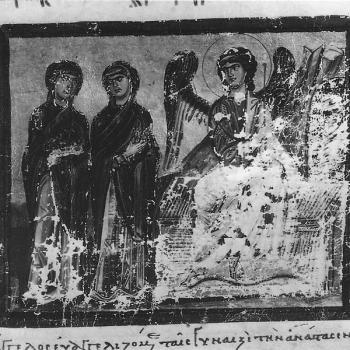Editors' Note: This article is part of the Patheos Public Square on the Spirituality of Sex. Read other perspectives here.
The first words God addressed to humans—even before forbidding eating fruit from the tree of knowledge of good and evil—was to engage in sex. Within the creation story, God, after forming humans in God's own image, told to them to copulate, the only way to "be fruitful and multiply." Not only were humans commanded to have sex, God declared it "good" (Genesis 1:31); which frankly is an understatement, for sex is really great! It is great because it fosters intimacy within relationships serving as basis for healthy and just communities. Yes, procreation allows humans to participate and continue in God's creation, for like God, humans have the ability to create new life; still, to believe the sole purpose of sexual intercourse is reproduction is both problematic and damaging.
Christianity, since its foundation, got sex wrong. For Clement of Alexandria, "to indulge in intercourse without intending children is to outrage nature" (Christ the Educator, II:10:95). Early in the development of Christianity, an attempt was made to equate sex with the forbidden fruit. According to Augustine, Adam and Eve's expulsion from the garden was the consequence of engaging in sex. Adam covered his genitals with fig leaves not out of modesty, but because he was sexually aroused. By linking shame and sex to the Christian doctrine of the Fall, Augustine argued aroused sexual organs signify human will toward the flesh, over and against the spirit (The City of God, XIV: 19, 21). The erect penis symbolizes man's rebellion to God, redefining sex as the cause for expulsion from Paradise. Almost seventeen hundred years later, many continue to believe desire for or participation in sex links us to Adam, who chose the things of this world rather than God's spiritual realm.
Early Christian thinkers reduced sex to a fear-driven discourse focused not on enjoyment and intimacy building, but pregnancy, transmittable diseases, or moral turpitude. Yet, what the Genesis text describes is sex being blessed by God. Rather than some "just say no," knee-jerk reaction, the text focuses on creating relationships where sex can and should occur. Early Christianity instead established such a negative view that it led St. Paula (347-404) to concluded, "I must disfigure that face which contrary to God's commandment I have painted with rouge, white lead, and antimony. I must mortify that body which has been given up to many pleasures. I must make up for my long laughter by constant weeping. I must exchange my soft linen and costly silks for rough goat's hair. I who have pleased my husband and the world in the past, desire now to please Christ" (St. Jerome, Letter CCIII, to Eustochium, 15:1).
Frustrating our ability today to interpret a pro-sex, pro-body interpretation of the biblical text is the false dichotomy created between the sacred (spirit) and what was defined as profane (the body). Crucial to early Christian thought was the concept of the flesh and spirit (or soul) struggling. Early Christian writers, highly influenced by this antagonistic body/soul dualism, stressed the danger believers faced who succumbed to the mortal body, as opposed to the immortal soul expected to inherit the eternal. Or as St. Paul remind us, "flesh and blood is not able to inherit God's kingdom, nor does corruption inherit incorruption" (1 Corinthians 15:50).
Ironically, the flesh-spirit divide is foreign to the Hebrew Bible; still, it became a prominent feature of early Christianity through the influence of Neoplatonic thought and Stoic philosophy with their proclivity for devaluing the body. The emphasis on obtaining inner peace through the human will's ability to control passions contributed to the overall pessimism regarding desire, specifically sexual desire. For the Stoics in particular, marriage became the means by which self-control was practiced where the rational reason for engaging in sex became procreation.
If sex's only purpose is "to be fruitful and multiple," than any sexual act which does not lead to procreation (i.e., oral sex, anal sex, masturbation, same-gender sex, contraception, sex during menstruation, sex after menopause, and/or sex for pure pleasure) are deemed unnatural and thus sinful. The only permissible sexual act was the missionary position within married heterosexual relationships. But even then, sex within marriage still took away from pleasing God. St. Jerome insisted that touching a woman, even one's wife, was akin to evil, for to touch a woman excluded one from being able to commune with God. As he advised, "either we pray always and are virgins, or we cease to pray that we may fulfill the claims of marriage" (Epistle XXII to Eustochium, 22:7). Those married man could not devote themselves fully to God's will and purpose (Epistle XLVIII to Pammachius, 14).




